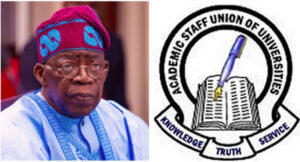The Emmanuel Alayande University of Education (EAUE) chapter of the Academic Staff Union of Universities (ASUU) has issued a passionate plea to President Bola Ahmed Tinubu, emphasizing the dire state of the Nigerian university system and the urgent need for intervention.
Dr. Micheal Bamidele Ojo, the ASUU Chairman of UAUE, highlighted the deplorable conditions in public universities and the precarious situation faced by lecturers.
He stressed that one of the crucial steps to address this crisis is for the president to sign a renegotiated agreement with the union, as salary awards alone cannot serve as a substitute.
Dr. Ojo emphasized that these agreements encompass not only salary components but also a comprehensive framework for developing a competitive university system capable of addressing Nigeria’s developmental challenges.

He underscored that ASUU’s demand for negotiated salaries and conditions of service aligns with the principles of “Collective Bargaining” outlined in the International Labour Organization’s convention No. 98. Notably, the last agreement between the FGN and ASUU was reached in 2009.
In a show of solidarity, members of the UAUED congress joined Dr. Ojo in a street protest, expressing their dissatisfaction with the federal government’s lack of willingness to address the union’s outstanding issues.
The union specifically called on President Bola Ahmed Tinubu’s administration to promptly initiate the process of reviewing and signing the renegotiated draft agreement led by Nimi Briggs. This action would demonstrate goodwill and provide hope for Nigeria’s public universities.
While warning of a potential strike in the coming weeks, the ASUU chairman emphasized that the union has been actively raising awareness among the Nigerian public for the past two months to ensure they are not caught off guard if a strike becomes necessary as a last resort.
Dr. Ojo appealed to various stakeholders, including opinion leaders, traditional and religious leaders, media organizations, labor movements, student groups, and civil society organizations, to intervene and implore both the federal and state governments to address the outstanding issues and engage in constructive dialogue with the union.
This collaborative effort is essential to prevent an unnecessary and avoidable industrial crisis in Nigeria’s already fragile and weakened university system.




